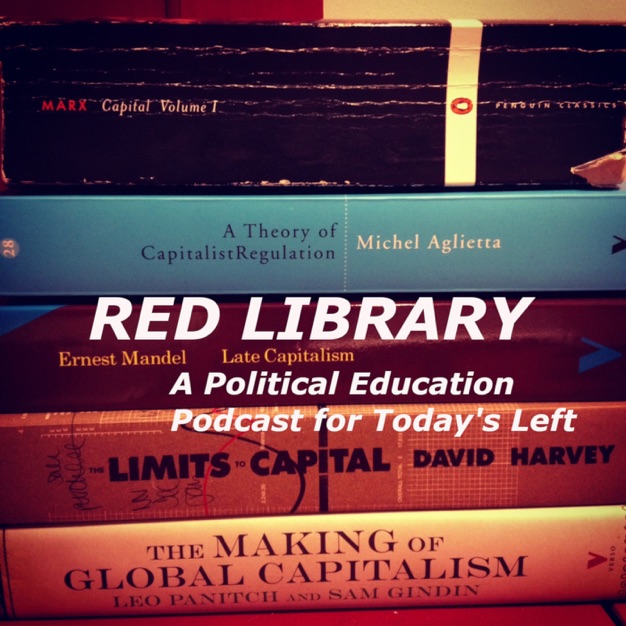
Cosmopod
Cosmonaut Magazine
The official Cosmonaut Podcast
- 1 hour 26 minutesSpanish Anarchism and the New Economy
Rudy joins Miguel Gómez, author of La CNT y la Nueva Economía: Del colectivismo empresarial a la planificación de la economía confederal (1936-1939) for a discussion on the most prominent Spanish anarchist union, the Confederación Nacional del Trabajo. We talk about the origins of the CNT, its base, its history under the Primo de Rivera dictatorship and its reactions to the formation of the Spanish Republic. We then talk about the currents within the CNT, and their ideas for what the economy should look like after the revolution, before turning to the time where they were able to put those ideas into practice during the Civil War. Finally, we discuss the intellectual highpoint of the CNT's economic program: the ideas about cooperative socialism proposed in 1938.
16 December 2024, 7:46 am - 1 hour 36 minutesMexico 1920-40: Building the Revolutionary State
Amelia, Carlos and Rudy sit down for the follow-up episode on the Mexican revolution to discuss the consolidation of the revolutionary state with a focus on the figure of Lázaro Cárdenas. They discuss the origins of yellow unionism and agrarian reform in Mexico, the presidency of Plutarco Calles and the Cristero War, and the radical period in the 1930s which led to mass expropriations, the nationalization of oil and a radical international policy.
Bibliography: B. Carr - Marxism & Communism in Twentieth-Century Mexico J. Cockroft - Mexico, Class Formation, Capital Accumulation, and the State G. Correa-Cabrera, R. A. Ragland - Workers, parties and a “New Deal:” A comparative analysis of corporatist alliances in Mexico, and the United States, 1910–1940 E. Ginzberg - Revolutionary Ideology and Political Destiny in Mexico, 1928-1934: Lazaro Cardenas and Adalberto Tejeda A. Knight - The Mexican Revolution: A Very Short Introduction T. Rath - Cardenismo, Revolutionary Citizenship, and the Redefinition of Mexican Militarism, 1934–1940 M. K. Vaughan - Cultural Politics in Revolution: Teachers, Peasants, and Schools in Mexico, 1930-1940 M. K. Vaughan, S. Lewis (ed.) - The Eagle and the Virgin: Nation and Cultural Revolution in Mexico, 1920–1940
10 December 2024, 7:54 am - 1 hour 35 minutesThe Untold Story of Gerry Healy and British Trotskyism by Aidan Beatty
James and Rudy join Aidan Beatty, author of The Party is Always Right: The Untold Story of Gerry Healy and British Trotskyism for a discussion on Gerry Healy. We discuss the figure of Gerry Healy, and his contextualization within the British left in the interwar and post-WW2 period and the evolution of his organization up to its dissolution by its own members. We also discuss the strict internal regime of the organizations he lead, the Socialist Labour League and the Workers Revolutionary Party, relating them to wider practices or accusations of cult-like behavior on the left.
Warning: this episode includes some minor references to the sexual harassment cases in the SLL/WRP.
22 November 2024, 7:38 pm - 2 hours 32 minutesSomalia: Colonialism, Socialism and War
Eric and Rob join Abdi for a discussion on Somalia from the colonial period to the present. They discuss the formation of the Somali people, the long and conflictual relationship to Ethiopia, British and Italian colonization and Somali independence before moving on to the scientific socialist period under Siad Barre. They discuss the achievements of this period, the origins of the Ogaden War conflict, and the abandonment of the USSR and of Socialism. They then discuss the disintegration of the Somali state, the long civil war, and the Islamic Court Union period, before giving some thoughts on the present.
10 November 2024, 6:35 pm - 1 hour 29 minutesWhere is the working class' power? An interview with Peter Olney and John Womack
Peter Olney is a labor organizer of over half a century, long-time organizing director at the ILWU, and researcher on labor strategy. John Womack is a Harvard historian of the labor movement and the Mexican Revolution. In this episode they sit down with Ira and Rudy to discuss Peter and John’s 2023 book Labor, Power, and Strategy. They discuss the controversial approach of organizing workers in the choke points of production, what it will take to rebuild the labor movement, and new opportunities for working class internationalism.
28 October 2024, 7:59 am - 2 hours 13 minutesBa'ath and Ba'ath: Arab Socialism in Syria and Iraq
Eric, Andrew and Rudy join for a discussion on the Arab Socialist Ba'ath Party in the two regions where it held power: Syria and Iraq, covering the history of both countries from the dissolution of the Ottoman empire up to the Hama Rebellion in Syria and the Kuwait War in Iraq. Among other topics we discuss the more military and sectarian character of the party in Syria, the 'left' and 'right' wings of Ba'athism, the figures of Salah Jadid, Hafez Assad and Saddam Hussein, the relationship between Ba'athism and Communism in Syria and Iraq, and what Ba'athism actually was as well as its relationship to Nasserism.
S. Aburish - Saddam Hussein: The Politics of Revenge H. Batatu - The old social classes and the revolutionary movements of Iraq N. van Dam - The Struggle for Power in Syria: Politics and Society under Asad and the Ba'th Party R. A. Hinnebusch - Syria: Revolution from Above E. Kienle - Ba'ath vs Ba'ath: The Conflict Between Syria And Iraq, 1968-1989 M. Khadduri - Independent Iraq 1932-1958: A Study in Iraqi Politics M. Khadduri - Republican Iraq: A Study in Iraqi Politics since the Revolution of 1958 M. Khadduri - Socialist Iraq: A Study in Iraqi politics since 1968 T. Ismael - The Communist Movement in Syria and Lebanon T. Ismael - The rise and fall of the Communist Party of Iraq
13 October 2024, 5:15 pm - 1 hour 45 minutesMarxism, Labourism, and the Roots of British Communism, 1884-1921 with Tony Collins
Rudy and Andreas join Tony Collins, author of Raising the Red Flag. Marxism, Labourism, and the Roots of British Communism, 1884–1921 for a discussion on the origins of the British Marxist movement from the creation of the Social Democratic Federation to the foundation of the Communist Party. We cover some of the important groups of the British Left at the time, the labor militancy before and during and after the First World War, and the founding of the Communist Party of Great Britain detailing which groups did not join the party. We discuss the weaknesses of the CPGB in the issues of Colonialism and its relationship to the Labour party before finishing with a discussion of how past issues can be reflected in the present.
29 September 2024, 9:13 am - 51 minutes 15 secondsEnding the One Party State: Reflections on Rhode Island Democratic Socialists of America
Tony Unger sets the record straight on Rhode Island DSA’s political experiences with the Democratic Party and need for class independence.
Read By: Christina Carman
Intro Music: ворожное озеро Гроза vwqp remix Outro Music: We are Friends Forever performed by Felix Dzerzhinsky Guards Regiment.
27 August 2024, 10:27 am - 1 hour 7 minutesPacific Gibraltar: A soft introduction to Hawai'i
Rudy joins Miguel, amateur historian of Hawai'i for a discussion on the history and present of the islands. We cover the first contact, the unification of the Hawai'ian kingdom, its pan-Oceanic profile, the overthrow of the Monarchy which leads to annexation and the Democratic Revolution before talking about the present struggles around military bases, tourism, land and water as well as the way that Hawai'ian identity has changed through the years.
References:
No Makou Ka Mana: Liberating the Nation Paperback – Kamanamaikalani Beamer Who Owns the Crown Lands of Hawai‘i? - Jon M. Van Dyke A Power in the World: The Hawaiian Kingdom in Oceania - Lorenz Gonschor Pacific Gibraltar: U.S.-Japanese Rivalry Over the Annexation of Hawaii, 1885-1898 - William Michael Morgan From a Native Daughter: Colonialism and Sovereignty in Hawaii - Haunani-Kay Trask
Articles:
Amid Calls For Diversification, A Look Back At Hawaii's History of Single-Industry Dominance
When a State of Emergency is Declared, We Should All be Alarmed
19 August 2024, 10:19 am - 1 hour 55 minutesThe Italian Communist Party: From Resistance to Dissolution
James, Steven and Rudy sit down to talk about the Italian Communist Party (PCI) from its foundation to its dissolution, with a focus on its period of maximum influence from the post-WW2 refoundation to the unraveling of the Historic Compromise in 1980 as well as the differences and similarities to the French Communist Party. We discuss the founding of the PCI in the aftermath of the First World War, followed by its destruction during the fascist period and how this destruction was a historic trauma of fascism that colored its post-WW2 strategy. We discuss how the party negotiated a place in the Italian political system, and how different tendencies within the party responded to events in the 50s and 60s. We then turn to the historic compromise, what it was and how it can be seen as a right-wing interpretation of the Popular Front. We finish by discussing the unraveling of the Popular Front, the dissolution of the party in the 1990s and the consequences on the present Italian left.
Bibliography: G. Amyot - The Italian Communist Party: The Crisis of the Popular Front Strategy P. Daniels, M. J. Bull - Voluntary Euthanasia: From the Italian Communist Party to the Democratic Party of the Left S. Hellman - Italian Communism in Transition: The Rise and Fall of the Historic Compromise in Turin, 1975-1980 L. Magri - The Tailor of Ulm: A History of Communism M. A. Macciocchi - Letters from inside the Italian Communist Party to Louis Althusser D. Sassoon - The Strategy of the Italian Communist Party: From the Resistance to the Historic Compromise R. Rossanda - The Comrade from Milan J. B. Urban - Moscow And The Italian Communist Party: From Togliatti to Berlinguer
Pre-fascist period: J. M. Cammett - Antonio Gramsci and the origins of Italian Communism P. Spriano - The occupation of the factories, Italy 1920 G. Williams - Proletarian Order: Antonio Gramsci, Factory Councils and the origins of Italian communism, 1911-1921
29 July 2024, 11:34 am - 55 minutes 7 secondsThe New Thing: Jazz Music in the Cold War, 1950-1970 with Christian Noakes
Jackson and Donald are joined by Christian Noakes author of Do It Yourself, Brother: Cultural Autonomy and the New Thing to discuss jazz music and musicians during the Cold War. We cover the U.S. state department's attempts to weaponize Jazz for imperial cultural diplomacy and how artists in the Jazz avant-garde of the 1950s-60s resisted the exploitation of their music by both the U.S. government and the capitalist music industry.
17 June 2024, 1:31 pm - More Episodes? Get the App
Your feedback is valuable to us. Should you encounter any bugs, glitches, lack of functionality or other problems, please email us on [email protected] or join Moon.FM Telegram Group where you can talk directly to the dev team who are happy to answer any queries.
 General Intellect Unit
General Intellect Unit
 Red Library: A Political Education Podcast for Today's Left
Red Library: A Political Education Podcast for Today's Left